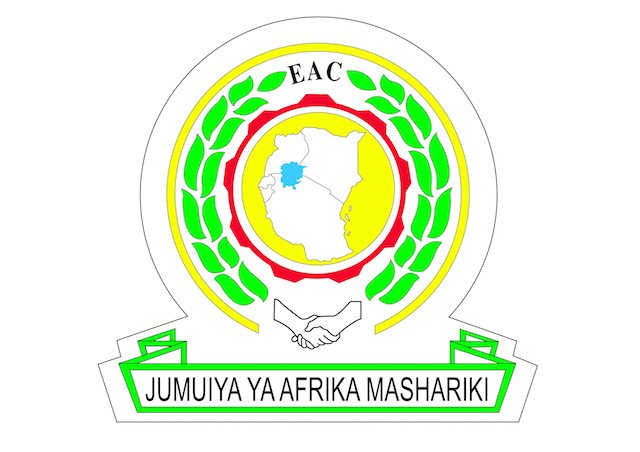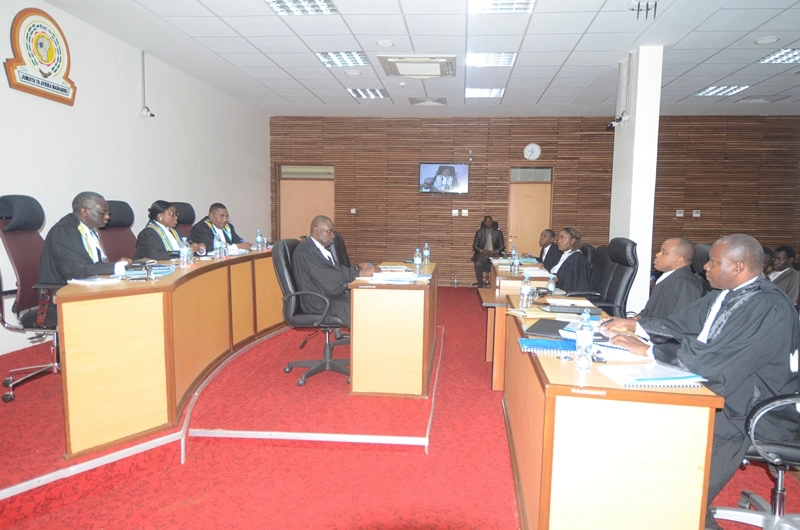
Posted in Press Release
East African Community Headquarters, Arusha, 5th March, 2018:
The East African Community has embarked on a landmark Work-load Analysis and Job Evaluation exercise that could substantially alter the organizational structure of the Community.
The 15-day exercise which is being conducted by experts from the six EAC Partner States has been convened in line with the directive of the 35th Meeting of the Council of Ministers which was held on 4th April, 2017 in Arusha, Tanzania which approved the terms of reference for work-load analysis and job evaluation.
The experts are drawn from the Public Service Commissions as well Ministries of Public Service in the Partner States.
Speaking when he officially unveiled the exercise, EAC Secretary General Amb. Liberat Mfumukeko said that one of the expected outcomes of the exercise would be a new organizational structure for the Community.
Amb. Mfumukeko said that the desired structure should be flexible and decentralized to allow speedy decision-making at all levels of the Community using fewer resources.
“To explain the relationship between EAC and the Partner States, I wish to point out that the role of the Secretariat is to coordinate and not implement projects and programmes,” he added.
The scope of the meeting which has been convened by the EAC Ad Hoc Service Commission includes: Undertaking a comprehensive analysis of all positions in the Organs and Institutions; Undertaking a comprehensive analysis of the proposed structures for EAC Organs and Institutions; Proposing a new Grading Structure for the Community, and; Reviewing and updating Job Descriptions for staff in the proposed structures.
The meeting will also: determine optimal staffing levels for EAC Organs and Institutions, and; determine an appropriate salary structure for the Community.
The SG advised the experts that effectively undertaking the assignment requires proper understanding of the direction that the Community would take over the next five years as portrayed in the 5th EAC Development Strategy that was launched by the Heads of State at their 19th Ordinary Meeting held in Kampala, Uganda on 23rd February, 2018.
“The expected organization structure will assist in the implementation of the above strategy. The work-load analysis and job evaluation will cover all EAC Organs and Institutions,” he said.
In his remarks, Mr. Frank Musingiwiire, the Deputy Secretary in the Uganda Public Service Commission, on behalf the Chairperson of the EAC Ad Hoc Service Commission, emphasized that the exercise would transform the Community for betterment of EAC Citizens.
Mr. Musingwiire urged EAC Staff and other stakeholders to own the process which he said would be as transparent as possible. He called on EAC staff to prepare and actively participate in the exercise.
EAC Deputy Secretary General in charge of Finance and Administration, Hon. Jesca Eriyo, said that the work-load analysis and job evaluation is a continuation of the institutional review which has been ongoing at the EAC for some time.
The 19th Ordinary Summit of the EAC Heads of State resolved that there would only two Deputy Secretaries General (DSGs), down from four, at the EAC Secretariat who shall be recruited competitively on a rotational basis.
The Summit directed the Council to follow up on the issue and conclude the restructuring of the Community. The EAC currently has four DSGs whose functional roles are: Planning and Infrastructure; Productive and Social Sectors; Finance and Administration, and; Political Federation.
Consequently, Hon. Eriyo, the DSG in charge of Finance and Administration, whose second and final term expires in April 2018, will not be replaced.
The EAC Organs – EAC Secretariat (EACS), East African Court of Justice (EACJ) and East African Legislative Assembly (EALA) – currently have a combined staffing of 314 officers, who are either established, project or short-term staff.
The Secretariat has the majority at 228, EACJ 53 while EALA has 33 members of staff.
NOTE FOR EDITORS:
The Council of Ministers, during its 33rd Meeting directed the EAC Secretariat to undertake a review of the proposed organizational structure for the initial phase and submit proposals to the 34th Meeting of the Council.
The 33rd Council further directed the Secretariat to determine the appropriate staffing levels for the EAC Organs and Institutions based on a detailed job evaluation process.
-ENDS-
For more information, please contact:
Mr Owora Richard Othieno
Head, Corporate Communications and Public Affairs Department
EAC Secretariat
Arusha, Tanzania
Tel: +255 784 835021
Email: OOthieno [at] eachq.org
About the East African Community Secretariat:
The East African Community (EAC) is a regional intergovernmental organisation of five Partner States, comprising Burundi, Kenya, Rwanda, Tanzania and Uganda, with its headquarters in Arusha, Tanzania.
The EAC Secretariat is ISO 9001:2008 Certified

Posted in Press Release
East African Legislative Assembly, Arusha, March 5, 2018:
The East African Legislative Assembly (EALA) resumes its Sitting in Arusha, Tanzania, this week. The Assembly convenes for the Third Meeting of the First Session of the 4th Assembly, which commences today March 5th , 2018 and runs until March 23rd, 2018.
Key items at the Sitting include the debate on the East African Community Oaths Bill, 2017. The Bill anticipates the provision for the taking and administering of Oaths in relation to the specific persons appointed to serve in the Organs or Institutions of the Community or required to take oath before giving evidence at the East African Court of Justice. The Bill moved by the Chair of the Council of Ministers, Rt Hon Dr Ali Kirunda Kivejinja, avers that whereas there are specific persons who are required by the Treaty like in the case of the Judges and Registrars of the East African Court of Justice if in justice matters, or an Act of the Community like in the case of EALA Members, in all other cases, oaths of allegiance are administered and taken in accordance with staff rules and regulations or by practice. The Bill which sailed through the First Reading at the recent Sitting in Kampala (2nd Meeting of the First Session) therefore hopes to cure the lacuna by providing for the administration of an oath as a statute.
In addition, the Report of the EALA on the on-spot assessment (tour) of the Northern and Central Corridors shall also be tabled and debated. The report follows the recent 13-day (February 12th-23rd, 2018) assessment of the institutions, facilities and installations of the EAC programmes in the Partner States undertaken by the Assembly.
At the tour, one team inspected the Northern corridor, commencing in Mombasa port and covering a total of 1,444 Kilometres to Kigali – through Nairobi, and Kampala. Another delegation of Members traversed concurrently, through the Central Corridor, from Dar es Salaam through to Bujumbura and eventually Kigali. Both teams then convened in Kigali, to crystallize the findings and for a wrap-up of the two-week tour.
The tour was initialised to enable Members to appreciate the operations of EAC Institutions and Authorities/Agencies that provide services, and the corresponding gains and challenges of integration. The tour also provided several fora to receive requisite feedback and recommendations from the citizens on their perception of the integration efforts so far.
Upon debate and if adopted, the Assembly shall provide the way forward in recommendations to be forwarded to the EAC Council of Ministers.
The Assembly also anticipates resumption of debate on the Address of the Chairperson of the EAC Summit of Heads of State delivered on January 23rd, 2018 at the Sitting in Kampala, Uganda. Delivering the speech, President Yoweri Kaguta Museveni reiterated need for the bloc to go full throttle and to unite the markets for prosperity of the people.
The President remarked the region stood to gain much more as a unified front. He cited the strategic security as key in integration and called on the region to effect better use of the existing common natural resources for its own prosperity citing Lake Victoria as a case in point.
The Sitting is also to be interspersed in Week 1 by rigourous Committee work as well as further induction for Members largely on audited accounts and the EAC Budget processes and framework.
NOTE TO EDITORS ABOUT EALA
The East African Legislative Assembly is the Legislative Organ of the East African Community. Its Membership consists of a total of 62, of whom 54 are elected Members (9 from each Partner State) and eight ex-officio members (the Ministers responsible for EAC Affairs from the Partner States, the Secretary General of the Community and the Counsel to the Community).
The East African Legislative Assembly has legislative functions as well as oversight of all East African Community matters. The enactment of legislation of the Community is effected by means of Bills passed by the Assembly and assented to by the Heads of State, and every Bill that has been duly passed and assented to become an Act of the Community and takes precedent over similar legislations in the Partner States. EALA has to date passed 79 pieces of legislation.
- ENDS -
For more information, please contact:
Bobi Odiko
Senior Public Relations Officer
East African Legislative Assembly
Arusha, Tanzania
Tel: +255-27-2508240
Fax: +255-27-2503103
Cell: +255-787-870945, +254-733-718036
Email: BOdiko [at] eachq.org
Web: www.eala.org
About the East African Legislative Assembly:
The East African Legislative Assembly (EALA) is the Legislative Organ of the Community and has a cardinal function to further EAC objectives, through its Legislative, Representative and Oversight mandate. It was established under Article 9 of the Treaty for the Establishment of the East African Community.


